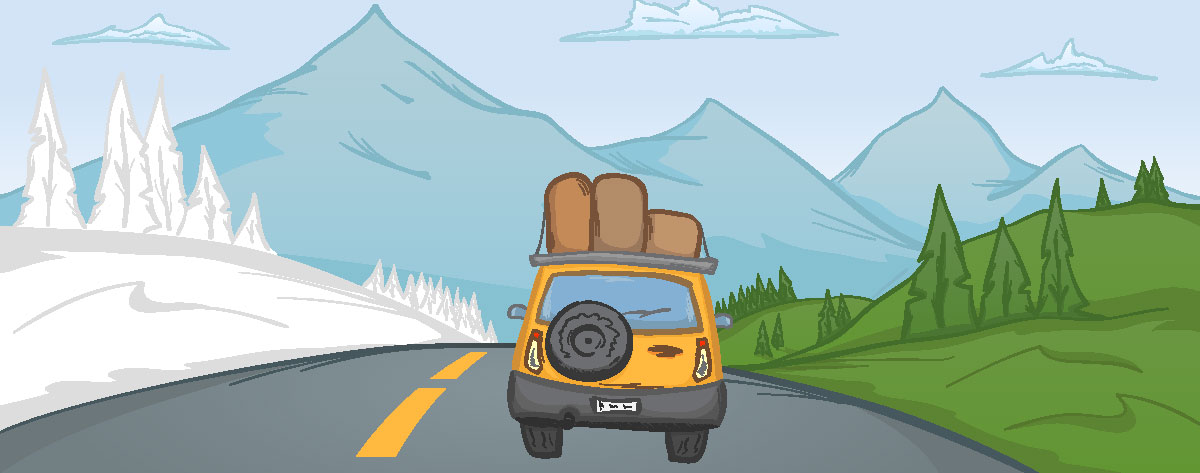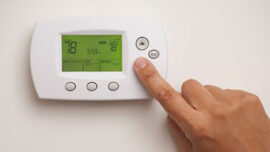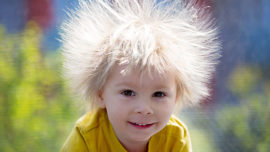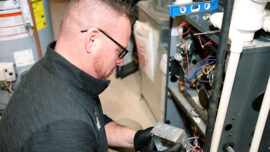
Headed South for the Winter? Here’s Our Snowbird Checklist.
Winterizing your home is important for everyone but it takes on a new meaning when you are a snowbird. Leaving your home for months at a time means you will not be there to tend to any problems that might arise from the frights of winter; things like, water damage, system malfunctions, or even theft. There are a several key things you can do to help protect your vacant home. Heading south for a few months for warmth and sunshine should cause nothing but joy and excitement; if you are overwhelmed by the amount of items you have on your checklist to do before you leave, you have come to the right place.

Stave Off Intruders
First things first, it is important that your home does not look unoccupied. Thieves watch homes for signs of vacancy, follow these steps to minimize your risk of a break-in.
- File with the police: doing so allows them to keep watch and contact you should anything happen to your home.
- Tell your neighbors: they can keep an eye on things and contact you with problems or concerns.
- Forward your mail, newspapers and have a friend pick up any packages that are delivered.
- Prearrange for someone to remove snow after storms to avoid buildup that would bring attention to your home.
- Confirm that your alarm system is activated and working.
- Consider motion-activated lights or timers to make it appear as though someone is home.
- Upgrade your locks. Secure outside doors with deadbolt locks and make sure all of your windows and sliding doors are properly secured.
- If you have any valuables, consider locking them away in a lock box or safe.
- Seemingly trivial but its not: avoid posting on social media about your extended leave. Thieves prowl social sites looking for targets.
- Also maintain your answering machine remotely; it is a clue to thieves the home is empty if it remains full for an extended period of time.

Take Care of Your Plumbing.
Bursting pipes or leaks can be a real problem for snowbirds.
- Consider turning off your water supply completely and then draining the pipes. But before you take this measure consult with your local plumber or HVAC contractor to determine if any major systems in your home require running water.
- Make sure you turn off water leading to all exterior faucets, remove any connected hoses and drain any water that may reside in the lines.
- You can go the extra mile and pour antifreeze in your toilet tanks to ensure they do not freeze, make sure it is nontoxic and consult with a plumber to ensure that it’s safe for your fixtures.
- If you decide to keep your water on, make sure you keep your house at a temperature that will prevent your pipes from freezing.
- Its advisable to still shut off water supply to washing machines and dish washers. These appliances can leak and the hoses can break wreaking havoc on your home’s interior.
- Purchase leak detectors and install them near your hot water heater, washing machine, garbage disposal and any plumbing that runs on an exterior wall. These detectors will send you a notification if a water leak is detected.
- Consider having a water flow sensor and a low temperature sensor installed onto your main water supply pipe, these can now be monitored on your smart phone.
- Also consider turning off the heat source and water supply to hot water heaters if they are separate from your boiler.

Maintenance and Prevention are Key
We suggest you call in a professional for the following tasks.
- Have your heating system cleaned and inspected. Call an HVAC professional to service your system, ensuring it is in good working order. Remember to change the filter before you leave, allowing the furnace to continue performing well all winter long.
- Set your home’s temperature to 55°F or higher to keep pipes and all necessary parts warm.
- If your home’s HVAC system is powered with fuel or oil, make sure the tanks are filled and set up deliveries if necessary, consider having someone you know and trust regularly check in on your home.
- Open all interior doors, cupboards – especially when there’s plumbing enclosed. This will help circulate warm air.
- Inspect your main electrical panel, wiring, and outlets. This is crucial if you go the route of keeping your home heated and need to maintain power while you are away. They will repair or replace anything that might be defective or hazardous.
- Unplug all appliances: this will save you money as they use a small amount of electricity when plugged in even if they are not being regularly used.
- Have your roof inspected and clean your gutters, ice buildup can cause major damage and require costly repairs.
- Call someone to safely remove any dead trees that might be at risk of falling on your home.
- Clean your home thoroughly, removing any traces of food or dirt that might attract pests or cause mold to form.
- Clean your refrigerator and dispose of any perishables. Consider emptying it completely and shutting it down, if you go this route prop the door open to prevent mold and mildew growth.
- Also open appliance doors, particularly your dishwasher and washing machine, again, allowing them to dry out and avoid mold and mildew build-up.
- Check your weather-stripping, insulation and exterior doors and windows. This will not only help keep cool air out, but moisture and insects as well!
- Have the chimney inspected and make sure your fireplace flue is closed. Also inspect that there no openings anywhere around your home for animals to enter.
Wow, that is quite the docket, right? The checklist for snowbirds is long and the responsibility is great, but I think everyone, especially those that stay in frigid temperatures, would agree that the warmth and sunshine are worth it. Naturally, there might be more for you to do, but we feel we have covered your bases to ensure a disaster-free departure. Good luck with your checklist and enjoy the delights of the holidays without the frights of winter weather.



